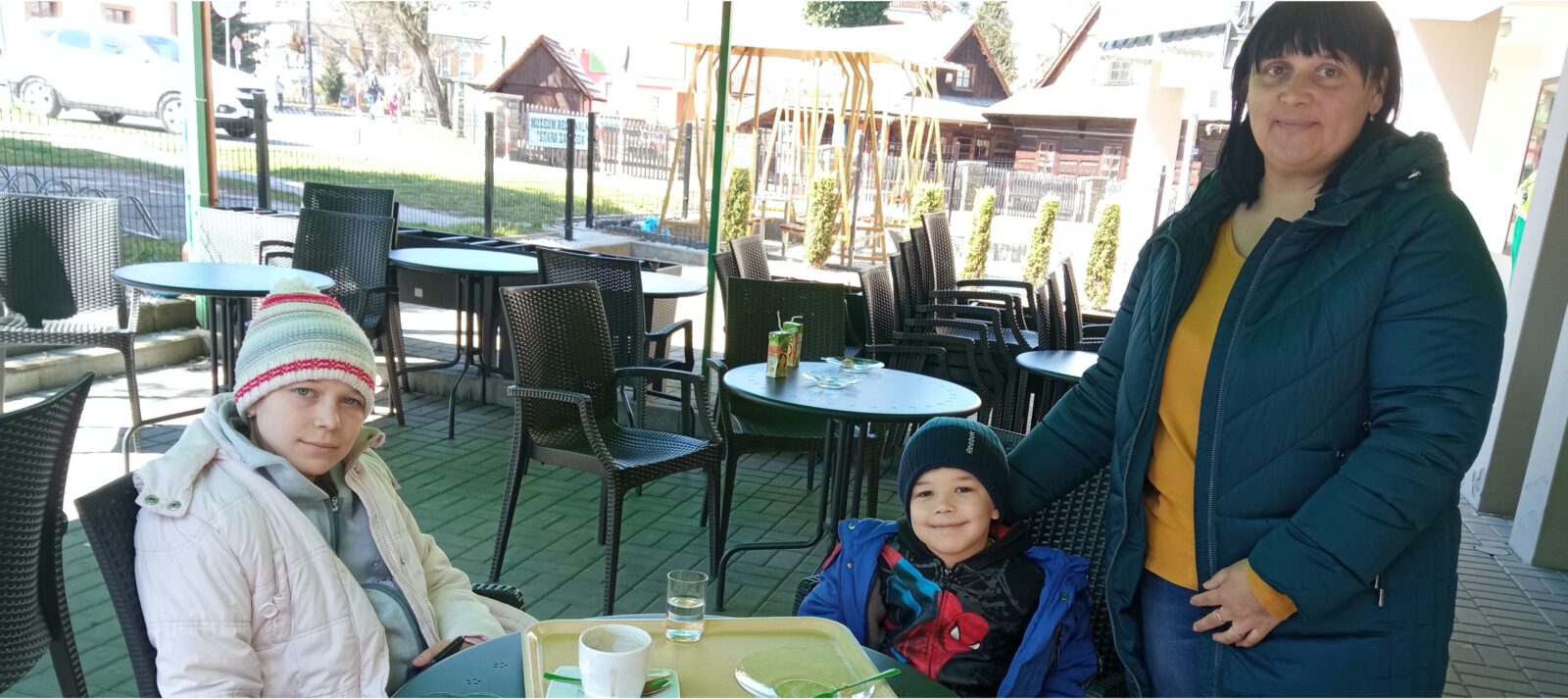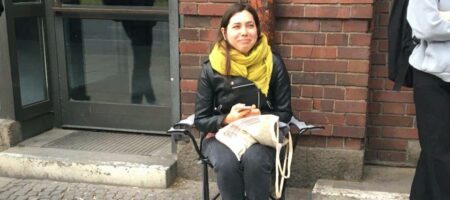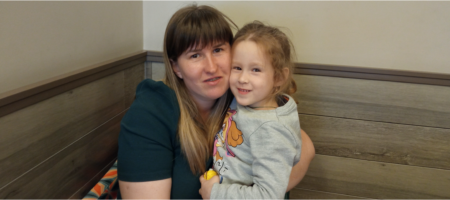Viktoria and her children are staying in comfortable hotel and share two bedrooms. They have everything they need; a good bathroom, meals three-times-daily, a television and free internet access. There is a perfect view from the window that opens to provide fresh air. Viktoria doesn’t have to pay for any of this and if it were not for the circumstances, it might feel like a dream holiday.
I tell my children that this is our Polish holiday.
Before the war began, Viktoria lived with her big family: her husband, her three children and her eldest daughter’s husband – plus their cat. They shared a home in Kryvyi Rih. Viktoria and her husband worked in the city, both with jobs in the metallurgical industry. Their children were all studying and the family looked forward to sharing holidays in Ukraine together.
Viktoria’s day began on 24th February at 06:30 with messages on her phone from the children’s schools to say that they were closed. Just twenty minutes later, Viktoria could hear explosions outside.
There is a military polygon not far from us, that’s what was bombed.
The early news about the beginning of war was all across social media. At this time, Viktoria’s husband was on his way to work. Everyone was really shocked. Despite there having been threats of war, it was still hard to believe that it has actually started.
I didn’t have any thoughts in my head in those early days. It was like I’d fallen out of life.
The situation was very uncertain. The city hadn’t yet been attacked, but some towns nearby had been severely damaged. The factory that Viktoria and her husband worked at closed, but the pair continued to work remotely. Many of their colleagues began to leave to join the army’s resistance.
The air raids began during the second week of the war.
We hid in the corridor where there were two walls – one one either side – for better protection.
Viktoria put mattresses on the floor for the children to sleep on because it was too hard to coordinate waking them all up from their bedrooms during the night. At this time, the family still wasn’t planning to leave the city – let alone the country.
Our city was prepared for attacks, but there was more time. The enemy was first attacking other areas that were closer to the Russian border.
Citizens in the neighbourhood were actively building military defences and block posts. Local men signed up to protect the territory. Women started organising meals and people were gathering money to support the military’s preparations.
Everyone has a different fear level. There were people who started running away in the first day of war, but others didn’t.
The city was surrounded by several layers of Ukrainian military protection and they were ready to push the enemy away from the city border.
We believe in our army and we knew that our local men would do everything to protect the territory.
Viktoria remembers how united people were as they worked to protect Kryvyi Rih and their homes: it felt like everyone was part of one big family. The Russian army attempted to get closer to the city but they were fought off at least fifty kilometres before the city’s border. Small villages around Kryvyi Rih were damaged – but fortunately most people had been evacuated from these places in advance.
Compared to other cities it was safe in ours, but their air raids were really frightening for the children.
Viktoria’s family was still in the city when her sister and brother-in-law left Ukraine. By this time, Viktoria’s youngest son was already too afraid to walk outside. Viktoria’s place of employment proposed that its staff should leave the country, supported by their refugee support programme; this was arranged in cooperation with the organisation’s Polish connections and colleagues.
My husband said that he would feel much more confident if the children and I were in a safe place.
It was clear that the threat of being bombed by the air was serious. As a mother, Viktoria was eager to protect her children from being stressed any further. Her husband decided to stay and help to protect the city, even though he could have left as there were more than three children in the family.
Viktoria’s employer organised everything very well and she left with her children on a bus with other worker’s families, too. On the 21st March they left the city and travelled for 24 hours with only short stops. Their journey took them through Kirovohrad, Uman, Ternopil and Lviv and at the border in Grushiv, a different bus was waiting for them to take them forward. This bus took them right to the hotel where everything was ready for their stay.
My son can finally walk outside without fear.
Viktoria appreciates that she is living in great conditions with everything that they need catered for. But she doesn’t forget that she is a displaced refugee. She has a great hope that they will be able to return to their homeland as soon as possible.
I don’t feel relaxed and I’m not in the right frame of mind to visit new places and enjoy views and the culture. I’m constantly reading the news and my mind is on home.
Posted on April 12th, 2022
Voices Ukraine



